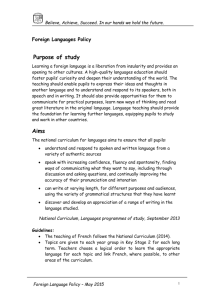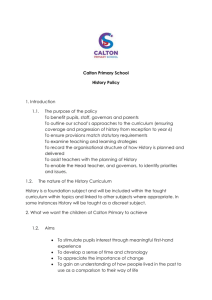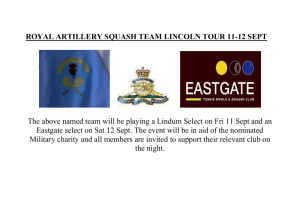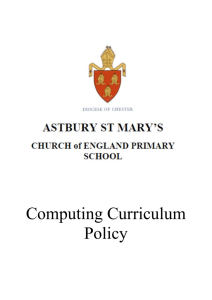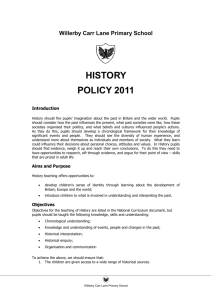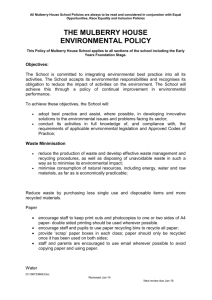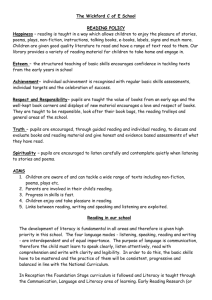Policy on History - Thorpedene Primary School
advertisement
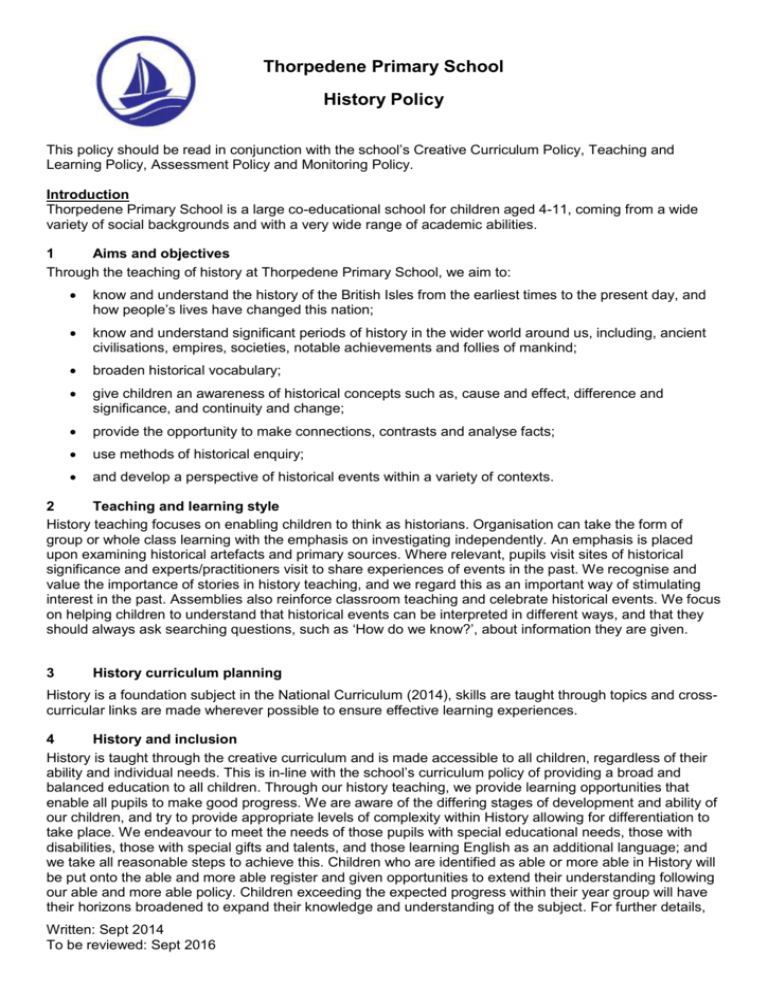
Thorpedene Primary School History Policy This policy should be read in conjunction with the school’s Creative Curriculum Policy, Teaching and Learning Policy, Assessment Policy and Monitoring Policy. Introduction Thorpedene Primary School is a large co-educational school for children aged 4-11, coming from a wide variety of social backgrounds and with a very wide range of academic abilities. 1 Aims and objectives Through the teaching of history at Thorpedene Primary School, we aim to: know and understand the history of the British Isles from the earliest times to the present day, and how people’s lives have changed this nation; know and understand significant periods of history in the wider world around us, including, ancient civilisations, empires, societies, notable achievements and follies of mankind; broaden historical vocabulary; give children an awareness of historical concepts such as, cause and effect, difference and significance, and continuity and change; provide the opportunity to make connections, contrasts and analyse facts; use methods of historical enquiry; and develop a perspective of historical events within a variety of contexts. 2 Teaching and learning style History teaching focuses on enabling children to think as historians. Organisation can take the form of group or whole class learning with the emphasis on investigating independently. An emphasis is placed upon examining historical artefacts and primary sources. Where relevant, pupils visit sites of historical significance and experts/practitioners visit to share experiences of events in the past. We recognise and value the importance of stories in history teaching, and we regard this as an important way of stimulating interest in the past. Assemblies also reinforce classroom teaching and celebrate historical events. We focus on helping children to understand that historical events can be interpreted in different ways, and that they should always ask searching questions, such as ‘How do we know?’, about information they are given. 3 History curriculum planning History is a foundation subject in the National Curriculum (2014), skills are taught through topics and crosscurricular links are made wherever possible to ensure effective learning experiences. 4 History and inclusion History is taught through the creative curriculum and is made accessible to all children, regardless of their ability and individual needs. This is in-line with the school’s curriculum policy of providing a broad and balanced education to all children. Through our history teaching, we provide learning opportunities that enable all pupils to make good progress. We are aware of the differing stages of development and ability of our children, and try to provide appropriate levels of complexity within History allowing for differentiation to take place. We endeavour to meet the needs of those pupils with special educational needs, those with disabilities, those with special gifts and talents, and those learning English as an additional language; and we take all reasonable steps to achieve this. Children who are identified as able or more able in History will be put onto the able and more able register and given opportunities to extend their understanding following our able and more able policy. Children exceeding the expected progress within their year group will have their horizons broadened to expand their knowledge and understanding of the subject. For further details, Written: Sept 2014 To be reviewed: Sept 2016 see separate policies: Special Educational Needs; Disability Discrimination; Gifted and Talented Children; English as an Additional Language (EAL). 5 Foundation stage In the Foundation Stage history is taught under People and Communities, EYFS (2012). They work towards achieving the expected Early Learning Goal: Children talk about past and present events in their own lives and in the lives of family members. They know that other children don’t always enjoy the same things, and are sensitive to this. They know about similarities and differences between themselves and others, and among families, communities and traditions. 6 Assessment and recording At Key Stage One pupils should achieve within their year group expectations by the end of each school year. By using their professional judgements the teacher will suggest whether a child is beginning, expected or exceeding the year group expectations, whichever best fits the individual child. Assessment is carried out within line with new curriculum guidelines and is carried out in line with the school’s Assessment and Feedback to children and parents policy. 7 Staff Development Opportunities are provided for staff to attend courses to develop their expertise. The staff development coordinator organises the application for courses in history in line with the school and staff development plan. 8 Resources Resources are held in a central area and include artefacts, dvds, books and posters. 9 Cross curricular links This policy links with the following policies: a. Literacy b. Mathematics c. PSHCE d. RE e. Music f. Art g. ICT h. Geography 10 i. Able and more able j. Foundation Stage Monitoring and Review Monitoring of teaching and learning takes place in-line with the school policy. This policy was devised in collaboration with staff and governors. The History policy will be reviewed every two years. Reviewed September 2014 by the Humanities Group (CK/NN) Written: Sept 2014 To be reviewed: Sept 2016



